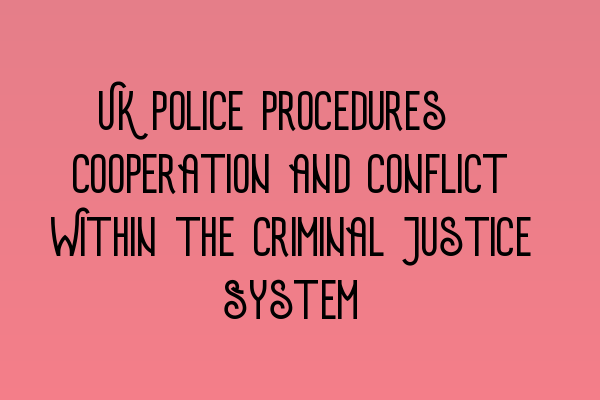UK Police Procedures: Cooperation and Conflict Within the Criminal Justice System
When it comes to criminal law in the UK, there is a complex web of procedures and protocols that govern the actions and behaviors of the police force. Understanding these procedures and how they interact with the criminal justice system is crucial for both legal professionals and those who may come into contact with the law.
Cooperation within the Criminal Justice System
Cooperation is a fundamental principle within the criminal justice system. It involves the collaboration of various parties, such as the police, prosecutors, defense attorneys, and the judiciary, to ensure the fair and efficient administration of justice.
One key aspect of cooperation within the criminal justice system is the gathering of evidence. The police play a vital role in collecting evidence at the scene of a crime and conducting thorough investigations. They work closely with forensic experts and other specialists to gather and analyze evidence that will form the basis of a criminal case.
Once the police have gathered the necessary evidence, they must then cooperate with the Crown Prosecution Service (CPS) to present the case for prosecution. The CPS reviews the evidence provided by the police and determines whether there is sufficient evidence to charge the suspect and proceed with a criminal trial.
In cases where the CPS decides to pursue charges, cooperation continues as the police and prosecutors work together to prepare the case for trial. This includes sharing information, witness statements, and other relevant documents to ensure both sides are adequately prepared for the courtroom.
Conflict within the Criminal Justice System
While cooperation is vital, conflicts can arise within the criminal justice system. These conflicts may occur between the police and other parties involved in the legal process, or between various branches of law enforcement.
SQE 1 Practice Mocks FLK1 FLK2
One common area of conflict is the balance between law enforcement and individual rights. The police have the authority to investigate and apprehend suspects, but they must also respect the rights of those individuals. This delicate balance, particularly when conducting searches and making arrests, can sometimes lead to conflicts with the individuals involved.
Another source of conflict within the criminal justice system is the competition for scarce resources. Different law enforcement agencies may have conflicting priorities and agendas, leading to disputes over jurisdiction and resource allocation. These conflicts can sometimes hinder the effective investigation and prosecution of criminal cases.
The Role of Legal Professionals
Legal professionals, including solicitors and barristers, play a crucial role in navigating these procedures and resolving conflicts within the criminal justice system.
Solicitors often work closely with the police during the pre-charge stage, advising their clients on police procedures and ensuring their rights are protected. They may also assist in gathering evidence and communicating with the CPS to ensure a fair and just outcome.
Barristers, on the other hand, often take on the role of representing clients in court. They utilize their expertise in criminal law and procedure to present the case effectively and argue for their clients’ best interests.
Understanding police procedures is essential for lawyers practicing criminal law, as it allows them to identify any breaches in procedure or conflicts that may arise during the course of a criminal case.
Conclusion
In conclusion, cooperation is vital within the UK criminal justice system, and it relies on effective communication and collaboration between the police, prosecutors, defense attorneys, and the judiciary. However, conflicts can arise due to competing priorities or a delicate balance between law enforcement and individual rights. Legal professionals play a crucial role in navigating these procedures and resolving conflicts to ensure the fair and efficient administration of justice.
If you’re interested in further information on related topics, be sure to check out our SQE 1 Preparation Courses, SRA SQE Exam Dates, and SQE 1 Practice Mocks FLK1 FLK2. They provide comprehensive resources and training to help you succeed in your legal career.
